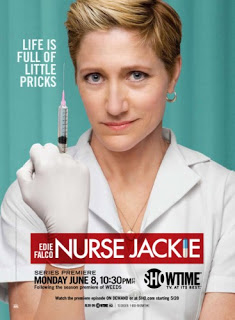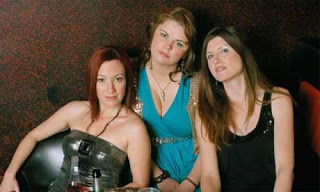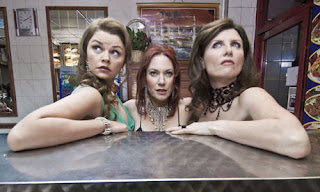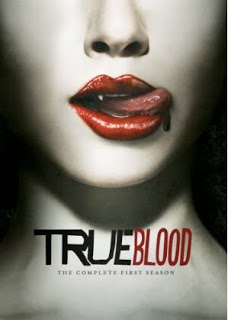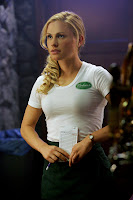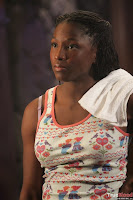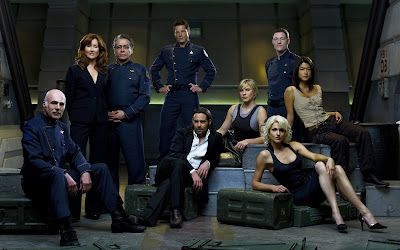As I began watching the second-season premiere of the Showtime series
The United States of Tara, I eagerly ask what I always do before an episode starts: “Which ‘alter’ will it be this time?”
Alas, to my dismay, the show’s bubbly focus on a recovered Tara Gregson (Toni Collette) meant that the “alters”–alternate personalities of this 21st century Sybil–were gone, thrown out like the unwanted clothing ceremoniously dumped into a charity bin in the show opener. Instead, we have happy, functioning Tara, and an upbeat musical soundtrack trying to manipulate us to believe that, indeed, all is well in the Tara-verse.
But we soon learn that Tara as one person, no longer suffering from dissociative identity disorder, is not nearly as fun or interesting as she is as five different people. Instead, the “true Tara” now displays some of the most annoying traits of all five of her alters.
She incorporates her Alice-esque alter by donning a 50s-style apron and throwing herself into a dinner party with the neighborhood’s token gay couple. She speaks her mind Buck-style (Buck was a beer-swigging male alter) when a neighbor commits suicide, bragging “The lady with all the personalities is not the most fucked up person on the block.” After the dinner party, her T-proclivities (that was the teenaged alter) come out, and she performs a manic Bollywood number, ending with provocative thrusting in her hubby’s face. Her sister Charmaine assures her new beau that Tara has not actually “transitioned” into the other personality, indicating that perhaps it would be better if she did, while Tara’s husband Max is visibly worried that the new “sane” Tara might be more insane than before.
Given the show’s emphasis on the self as performative, and on the impossibility of performing to societal standards (especially if one is female), this suggestion that Tara’s recovery may not be a step forward is intriguing. Though the show reveals all the difficulties Tara’s disorder causes for her and her family, it also seems to be indicating that the real problem is a society that expects us to perform in very particular, stable and normative ways. These regulatory ideals are so oppressive that we either bind ourselves into limited roles (i.e., Alice-the-50s-housewife) or run the risk of being seen as “crazy”–as “normal” Tara is when she laughs too loud, makes a suicide joke or has too much fun at a dinner party.
The show’s underlying critique of such normative ideals, and the relatively freeing notion of embracing the self as performance, is evident in other characters as well. Marshall, Tara’s closeted gay son, tries hard to be serious, smart and talented, but finds that flaunting his identity by sitting at the “gay-ble”–the school lunch table where gays and their allies sit–is a welcome relief, and results in him joining a campaign at his school aimed to raise queer visibility.
Charmaine, Tara’s sister, struggles with regulatory norms in choosing between a relationship with traditional hunk Neil vs. unattractive and vertically challenged Nick, who is personality-privileged and emotionally supportive. Charmaine tried to follow normative requirements in the past by augmenting her breasts to please her then-husband, a choice that resulted in lopsided and off-center nipples. Now that she has had these “corrected,” she seems to believe she can do better than short, balding Nick.
The character of Tara’s teenaged daughter Kate has thus far been largely challenged around the regulation of her sexuality, as indicated with Tara’s concern that she was not able to “micromanage her daughter’s vagina.” Kate’s struggles with a creepy boss and an abusive boyfriend expose a society populated by males wishing for similar micro-managing power.
Max appears to be the character least affected by social norms. He doesn’t seem to care that his wife is far from typical, worrying only about her health and happiness rather than what others think. He does not condemn or regulate his son’s sexuality nor attempt to micromanage his daughter. If any character seems too good to be true, it’s him. This is perhaps why Max is a bit empty as a character: a sort of dad/husband placeholder who comes off as boring and conventional in a cast of otherwise entertaining family members.
While Robert Abele laments at L.A. Weekly that “United States of Tara plays like surface feminism with an added gloss of snark and a bewilderingly blah sentimentality,” I would counter that the snark is integral to the feminist critique the show enacts. The snark reveals that our “normal” selves are “blah,” and thus we should embrace those aspects of our identity that subvert regulatory norms lest we end up living in a world full of bores.
Diablo Cody, the show’s creator, readily admits that she asks of everything she writes, “How am I going to sneak my subversive feminist message into this?” With Tara, she sneaks in this message beautifully, conveying that societal ideals–be they a stable self, heterosexuality or conventional attractiveness–do not an exciting world (or episode) make.
Natalie Wilson, PhD is a literature and women’s studies scholar, blogger, and author. She teaches at Cal State San Marcos and specializes in the areas of gender studies, feminism, feminist theory, girl studies, militarism, body studies, boy culture and masculinity, contemporary literature, and popular culture. She is author of the blogs Professor, what if…? and Seduced by Twilight. She is a proud feminist mom of two feminist kids (one daughter, one son) and is an admitted pop-culture junkie. Her favorite food is chocolate.


